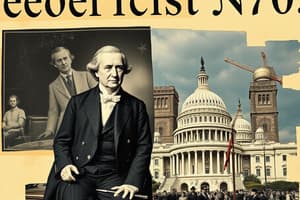Podcast
Questions and Answers
How does the opening of this excerpt affect the writer's argument?
How does the opening of this excerpt affect the writer's argument?
By beginning his argument with an immediate criticism of the existing federal government, he portrays it as a system in need of improvement.
What effect does the author's use of first-person point of view have on his argument?
What effect does the author's use of first-person point of view have on his argument?
It establishes a sense of agreement between Hamilton and the reader.
Which of the following sentences from the excerpt exemplifies an attempt to sway the reader's opinion of the writer's opponents?
Which of the following sentences from the excerpt exemplifies an attempt to sway the reader's opinion of the writer's opponents?
- Hamilton remains neutral about his opponents.
- Hamilton claims his opponents only want the best for America.
- Hamilton describes his opponents as loud and bitter. (correct)
- Hamilton suggests his opponents are rational and controlled.
Why does the writer follow paragraph three by stating, "It is not, however, my design to dwell upon observations of this nature"?
Why does the writer follow paragraph three by stating, "It is not, however, my design to dwell upon observations of this nature"?
As used in the final sentence of the excerpt, what does the word 'obsequious' mean?
As used in the final sentence of the excerpt, what does the word 'obsequious' mean?
Flashcards are hidden until you start studying
Study Notes
Opening Criticism
- Hamilton starts with a critique of the federal government, indicating a need for improvement.
- This approach positions the government as ineffective, potentially convincing readers of the necessity for change.
- The critique is directed at the government's performance rather than the Constitution itself.
Use of First-Person Point of View
- Hamilton employs first-person pronouns like "we" to foster a connection with the reader.
- This method creates a shared sense of purpose and concern about the nation.
- The tone remains serious and does not become overly informal despite the personal address.
Characterization of Opponents
- Hamilton portrays his opponents as "loud and bitter," implying emotional instability.
- Such descriptors aim to diminish the credibility of his adversaries and entrench his own position.
- The characterization seeks to present opposition figures as irrational, boosting Hamilton's argument.
Transition in Argument
- Hamilton asserts that his intention is not solely to criticize opponents after a pointed attack against them.
- This statement serves to balance his argument, avoiding a solely negative portrayal.
- Despite this claim, Hamilton continues to critique his rivals throughout the excerpt, showing a complex rhetorical strategy.
Meaning of "Obsequious"
- "Obsequious" is used in the context of a tyrant requiring submission from followers.
- In this context, it implies compliance and subservience to demands.
- The term highlights the dangers of a lack of resistance against authoritarian figures, linking it to the broader themes of power and governance.
Studying That Suits You
Use AI to generate personalized quizzes and flashcards to suit your learning preferences.



